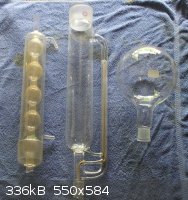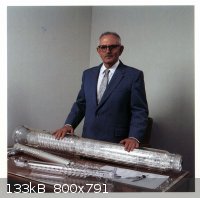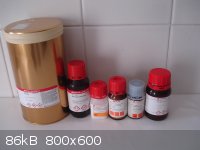| Pages:
1
2
3 |
The WiZard is In
International Hazard
    
Posts: 1617
Registered: 3-4-2010
Member Is Offline
Mood: No Mood
|
|
My Mono-pole magnets
A technological marvel, however, a financial failure. Because
they were either both ended North or South, people were
only willing to pay half despite their high cost of fabrication.
In despair I destroyed all my samples - burned my lab notes -
and swore a sacred oath never to reveal their method of production.
djh
----
Eventually we eliminated all flaws,
using the method of proof by
exhaustion - anyone, including us,
who tired to analyze the model
would get exhausted before they
understood it well enough to find
the flaws.
Frank Wilczek
Nature 428, 261 (2004)
On Savas Dimopoulos and his work on supersymmetry
[Edited on 19-6-2011 by The WiZard is In]
|
|
|
Mixell
Hazard to Others
  
Posts: 449
Registered: 27-12-2010
Member Is Offline
Mood: No Mood
|
|
Mix (very well) molar amounts ( 3:1 ratio) of NaOH (prills or powder) with a finely divided manganese dioxide powder, I used 10-15 grams of NaOH. Put
it all in a beaker and mix well. Put it on a hotplate and heat the hotplate to about 300 degrees, so if you put a prill of NaOH directly on the
hotplate- it will melt (but do not heat above that). Steer and divide possibly accumulating masses of matter every few minutes. Check every 10 min a
small sample of the mix, when all of it will be blue (allow for a tiny bit of unreacted MO2 to remain, if they refuse to react, you can't win them
all) switch off the hotplate and allow it to cool while stirring every 2-3 minutes, thats basically it. Be prepared for the fact that the bottom of
the beaker will be slightly damaged. If all goes well- post some pictures, May be I will do the same in a few days.
|
|
|
redox
Hazard to Others
  
Posts: 268
Registered: 22-2-2011
Location: The Land of Milk and Honey
Member Is Offline
Mood: Chalcogenetic
|
|
What is the name of Na3MnO4? Sodium Hypomanganate? Trisodium manganate? Sodium hypopermanganite? Sodium manganate (VI)?
[Edited on 19-6-2011 by redox]
My quite small but growing Youtube Channel: http://www.youtube.com/user/RealChemLabs
Newest video: Synthesis of Chloroform
The difference between chemists and chemical engineers: Chemists use test tubes, chemical engineers use buckets. |
|
|
Mixell
Hazard to Others
  
Posts: 449
Registered: 27-12-2010
Member Is Offline
Mood: No Mood
|
|
Sodium Hypomanganate, and the oxidation state of manganese is +5, not +6.
|
|
|
redox
Hazard to Others
  
Posts: 268
Registered: 22-2-2011
Location: The Land of Milk and Honey
Member Is Offline
Mood: Chalcogenetic
|
|
Thanks Mixell, I meant to type +V,
permanganate: VII
manganate: VI
hypomanganate: V
My quite small but growing Youtube Channel: http://www.youtube.com/user/RealChemLabs
Newest video: Synthesis of Chloroform
The difference between chemists and chemical engineers: Chemists use test tubes, chemical engineers use buckets. |
|
|
Jor
National Hazard
   
Posts: 950
Registered: 21-11-2007
Member Is Offline
Mood: No Mood
|
|
Quote: Originally posted by Mixell  | | Mix (very well) molar amounts ( 3:1 ratio) of NaOH (prills or powder) with a finely divided manganese dioxide powder, I used 10-15 grams of NaOH. Put
it all in a beaker and mix well. Put it on a hotplate and heat the hotplate to about 300 degrees, so if you put a prill of NaOH directly on the
hotplate- it will melt (but do not heat above that). Steer and divide possibly accumulating masses of matter every few minutes. Check every 10 min a
small sample of the mix, when all of it will be blue (allow for a tiny bit of unreacted MO2 to remain, if they refuse to react, you can't win them
all) switch off the hotplate and allow it to cool while stirring every 2-3 minutes, thats basically it. Be prepared for the fact that the bottom of
the beaker will be slightly damaged. If all goes well- post some pictures, May be I will do the same in a few days. |
First of all, I would do this in a steel crucible.
Second, you did not isolate the sodium hypomanganate in pure form. It likely still contains some NaOH impurities and probably some unreacted MnO2.
But do you think it is 80-90+% pure?
[Edited on 19-6-2011 by Jor]
|
|
|
Mixell
Hazard to Others
  
Posts: 449
Registered: 27-12-2010
Member Is Offline
Mood: No Mood
|
|
There was a very small excess of MnO2, to prevent an excess of NaOH. But I'm pretty sure, judging by the looks, that it is 90-95% pure. You can notice
small pieces of MnO2, but they are less then 5-7% of the whole powder. And about the steel crucible, that is probably the right choice, I just used
what I had.
|
|
|
Lambda-Eyde
National Hazard
   
Posts: 860
Registered: 20-11-2008
Location: Norway
Member Is Offline
Mood: Cleaved
|
|
My standard tapered glassware:

Not shown are the two distillation setups (one 24/40 and one 24/29-19/26) and some flasks. In the bottom right corner is the centerpiece: a 25 cm
quartz test tube with a 24/29 male joint. 
Of the chemicals, I particularly value:
1 L carbon disulfide
500 ml carbon tetrachloride
500 ml benzyl alcohol
500 ml cyclohexanol
500 ml t-butyl alcohol (those alcohols open for some interesting chemistry!)
50 g mercury(II) chloride
~100 g white phosphorus
25 ml bromine (self made)
1 L methanol (because I needed a police permit, same with the phosphorus and 1 L dichloromethane)
This just in: 95,5 % of the world population lives outside the USA
Please drop by our IRC channel: #sciencemadness @ irc.efnet.org
|
|
|
ItalianChemist
Hazard to Others
  
Posts: 172
Registered: 26-1-2011
Location: Italy
Member Is Offline
Mood: No Mood
|
|
Quote: Originally posted by Mixell  | | Mix (very well) molar amounts ( 3:1 ratio) of NaOH (prills or powder) with a finely divided manganese dioxide powder, I used 10-15 grams of NaOH. Put
it all in a beaker and mix well. Put it on a hotplate and heat the hotplate to about 300 degrees, so if you put a prill of NaOH directly on the
hotplate- it will melt (but do not heat above that). Steer and divide possibly accumulating masses of matter every few minutes. Check every 10 min a
small sample of the mix, when all of it will be blue (allow for a tiny bit of unreacted MO2 to remain, if they refuse to react, you can't win them
all) switch off the hotplate and allow it to cool while stirring every 2-3 minutes, thats basically it. Be prepared for the fact that the bottom of
the beaker will be slightly damaged. If all goes well- post some pictures, May be I will do the same in a few days. |
Thank you! Let me find MnO2 and i'll try it!
|
|
|
Mixell
Hazard to Others
  
Posts: 449
Registered: 27-12-2010
Member Is Offline
Mood: No Mood
|
|
You can get it from decomposition of KMnO4 at ~250C, and don't forget to do it in a steel crucible is you have one.
[Edited on 20-6-2011 by Mixell]
|
|
|
ItalianChemist
Hazard to Others
  
Posts: 172
Registered: 26-1-2011
Location: Italy
Member Is Offline
Mood: No Mood
|
|
Quote: Originally posted by Mixell  | You can get it from decomposition of KMnO4 at ~250C, and don't forget to do it in a steel crucible is you have one.
[Edited on 20-6-2011 by Mixell] |
Heating KMnO4 gave me only K2MnO4...so I dissolved KMnO4 in water and I added 35% H2O2 until violet color has disappeared...and MnO2 precipitated out
[Edited on 21-6-2011 by ItalianChemist]
|
|
|
IPN
Hazard to Others
  
Posts: 156
Registered: 31-5-2003
Location: Finland
Member Is Offline
Mood: oxidized
|
|
I see others like their soxhlets too. 
I take extra pride in mine. 
2l flask for comparison.

|
|
|
The WiZard is In
International Hazard
    
Posts: 1617
Registered: 3-4-2010
Member Is Offline
Mood: No Mood
|
|
When I win the lottery....
I'll buy a couple of these -

and an insurance policy.
|
|
|
Mildronate
Hazard to Others
  
Posts: 428
Registered: 12-9-2009
Member Is Offline
Mood: Ruido sintetico
|
|
From reagents Thallium acetate and 100 years old Merch Aluminium chloride (dry, attachment X-ray spectrum).
[Edited on 24-6-2011 by Mildronate]
Attachment: AlCl3.pdf (37kB)
This file has been downloaded 650 times
|
|
|
hkparker
National Hazard
   
Posts: 601
Registered: 15-10-2010
Location: California, United States
Member Is Offline
Mood: No Mood
|
|
Quote: Originally posted by IPN  | I see others like their soxhlets too. 
I take extra pride in mine. 
2l flask for comparison. |
thats next to a 2L flask?! now <i>thats</i> what I call a soxhlet extractor! Wish I could afford one right now, but I don't have enough
of a use. My ST glass collection is still pretty small.
My YouTube Channel
"Nothing is too wonderful to be true if it be consistent with the laws of nature." -Michael Faraday
|
|
|
Jor
National Hazard
   
Posts: 950
Registered: 21-11-2007
Member Is Offline
Mood: No Mood
|
|
Some pictures of my glassware, precious materials and some nice useful chems 

My glassware with joint, excluding my RBFs (I have 6 3-necks of all different sizes up ranging from 25 to 250mL), my 5 1-necks, 250mL NS29 erlenmeyer,
seporatory funnel one more condensor and adapters/stoppers.

Precious metal (compounds). From left to right:
NH4ReO4, RuO2, Pd (3g), Pt (600mg), Au (about 12-13g), mixed Pd and Pt powder of unknown composition (about 4g), Pd foil (from reduction wich formed
mirror, about 0,5-0,6g), about 3,5g (NH4)2PtCl6 (much more yellow in reality) and homemade luminol.
In the front are silver, GeO2 and an ampoule containing a gram of chloroplatinic acid.
I forgot to picture my 100mL of pure 2% HAuCl4-solution (contains about 1g of gold) and 100mL of 1,2% H2PtCl6-solution.

Some more interesting chems.
Left to right: NaN3 in small bottle, CCl4, KCN (50 grams in little bottle), Ac2O, white P, P4O10, 10mL of trifluoroacetic anhydride, 5g 5% Pt on
kaowool and acetonitrile in the large Merck bottle.
|
|
|
ItalianChemist
Hazard to Others
  
Posts: 172
Registered: 26-1-2011
Location: Italy
Member Is Offline
Mood: No Mood
|
|
WOW!
I like very much Ru compounds, but they are very expensive!
|
|
|
Arthur Dent
National Hazard
   
Posts: 553
Registered: 22-10-2010
Member Is Offline
Mood: entropic
|
|
@ Jor: Nice collection of gears and chems. I have a very nice selection of glassware, but nowhere near the collection of chems you have. Always useful
to have a vast array of compounds and reagents. The selection of OTC chems is very limited and the reagent grade chems from lab suppliers are insanely
expensive.
Robert
--- Art is making something out of nothing and selling it. - Frank Zappa ---
|
|
|
cyanureeves
National Hazard
   
Posts: 744
Registered: 29-8-2010
Location: Mars
Member Is Offline
Mood: No Mood
|
|
Jor nice collection of things. may i ask a couple of questions about KCN ? have you ever made potassium gold cyanide? how much gold would that bottle
dissolve? have you ever witnessed gold being dissolved by cyanide? i read that it will dissolve gold without even adding water. i've always wondered
why the folks back when electroplating was first done went straight to the cyanide complexes and not for nitrate salts or chloric solutions that were
known. lastly have you ever smelled the KCN and how would you describe the smell? i thought about u2u you with these questions but i think they are
safe questions to ask. thank you for pictures.
|
|
|
Jor
National Hazard
   
Posts: 950
Registered: 21-11-2007
Member Is Offline
Mood: No Mood
|
|
@Italian :Yea I also love Ru-compounds. This was a really kind gift from woelen 
@Arthur: Yes I know. I payed a lot of money for my reagents, that's the downside. The good side is that I can buy almost anything I want except for a
few CWC chemicals like SOCl2. But even that is not a problem anymore, because soon I will buy about 250mL of the stuff via a Dutch home chemist! 
@cyanureeves: No I have not yet made KAu(CN)2 but I will some day. You just suspend the gold into dilute KCN-solution and bubble through air or pure
oxygen, wich acts as the oxidiser. I have not yet smelled cyanide, so I do not know if I can smell it. I always work uner a fume hood with it, as it
is risky stuff (a fatal amount of gas will knock you out without warning, more dangerous than gasses like chlorine, wich at least give you time to go
to the hospital). I am not sure how to safely smell it. I don't know if I can smell it meaning that I would keep trying to smell it if I don't smell
it in a smell test (what a sentence  ). ).
It is supposed to smell like nitrobenzene/benzaldehyde? Anyone experience? I know there are people who can't smell it, one example IIRC is woelen,
right?
Funny we are talking about CN-compounds, yesterdag I made the compound Mn(en)[Ni(CN)4] from MnCl2-solution, K2[Ni(CN)4] solution (made from 2,80g KCN,
so quite alot  ) and ethylenediamine. It not that exciting however, a light brown
powder. ) and ethylenediamine. It not that exciting however, a light brown
powder.
[Edited on 25-6-2011 by Jor]
|
|
|
woelen
Super Administrator
        
Posts: 8027
Registered: 20-8-2005
Location: Netherlands
Member Is Offline
Mood: interested
|
|
I am most proud of my element collection. It already contains quite a few elements in high quality samples:
http://woelen.homescience.net/science/chem/compounds/index2....
I also have quite a few special compounds. The ones most precious to me are:
- 80 grams of RuO2
- 150 grams of NH4ReO4
- 8 grams of H2PtCl6
- 1 gram of OsO4
- 4 grams of HAuCl4
Besides these very expensive metal compounds I have quite a few uncommon chemicals which I also value very much:
- K3Co(CN)6
- K2TeO3
- Na2SeO3
- Na2SeO4
- SeO2
- KCN
- NaCN
- PCl5
- SOCl2
- CH3COCl
- (COCl)2
- GeO2
- LiAlH4
- NaBH4
- NbCl5
- As4O10
- CF3COOH
All of the above I have in tens of grams quantities or more.
These are the real special ones and very hard to obtain. You really must run against them by luck. I obtained all of them from personal contacts, none
of them through the standard chemical sellers, who do not sell that kind of stuff to private persons. Furthermore I have most of the more common stuff
like sulfates, nitrates and/or chlorides of the first row transition metal salts, the common oxidizers, chromates and dichromates, chlorates,
perchlorates, bromates, iodates.
I also have a decent set of glassware and a lot of special equipment, good for many chemistry and physics experiments.
[Edited on 25-6-11 by woelen]
|
|
|
cyanureeves
National Hazard
   
Posts: 744
Registered: 29-8-2010
Location: Mars
Member Is Offline
Mood: No Mood
|
|
cool Jor. dont be in a hurry to smell the stuff. i was just asking because i didnt know if the odor jumps at you or if you had to bury your nose in a
jar or something.CN compounds are so very interesting to me and have been very difficult for me to make as it turns to ammonia and hydroxide or
carbonate almost instantly.all the stuff i have used to make good prussian blue but now it just turns orange with iron sulfate. on another note i have
just made 1litre of almost pure ethanol from 6lbs. of sugar yeast and corn meal. i used a thompson water seal can and aluminum tubing as a stil. in
all my 50yrs. i had never made alcohol. i'm proud of my alcohol i guess. whooosh! white(undrinkable) lightning.
|
|
|
ItalianChemist
Hazard to Others
  
Posts: 172
Registered: 26-1-2011
Location: Italy
Member Is Offline
Mood: No Mood
|
|
Here are my favourite reagents
From left to right:
Bromine, benzoyl chloride, benzyltriphenylphosphonium chloride, anthracene-9-carbaldehyde, oxalyl chloride and rhodamine B
Next week I'll get some Rubrene and sodium

|
|
|
barley81
Hazard to Others
  
Posts: 481
Registered: 9-5-2011
Member Is Offline
Mood: No Mood
|
|
I value my nitric acid, teflon capped vials, alkalis, and metals, 1 oz of each (pure):
Silver 
Copper
Cupronickel
Tin
Zinc
A kind gift from my tennis teacher, whose nephew has a metal company.
|
|
|
sternman318
Hazard to Others
  
Posts: 121
Registered: 21-4-2011
Member Is Offline
Mood: No Mood
|
|
@Woelen
I see pictures of your precious collection all over Wikipedia 
" Black top... short glass vial.... textured background... yup, it's Woelen's sample"
[Edited on 1-7-2011 by sternman318]
|
|
|
| Pages:
1
2
3 |